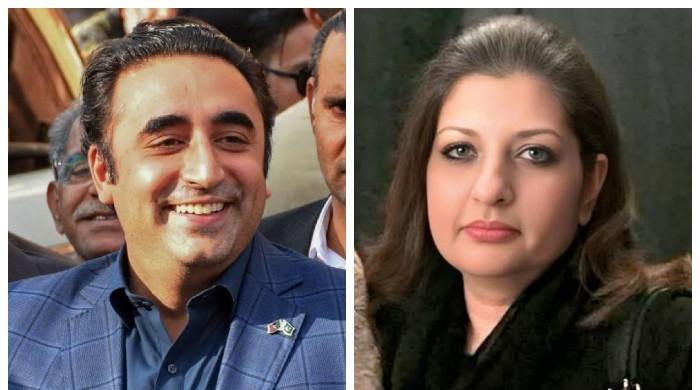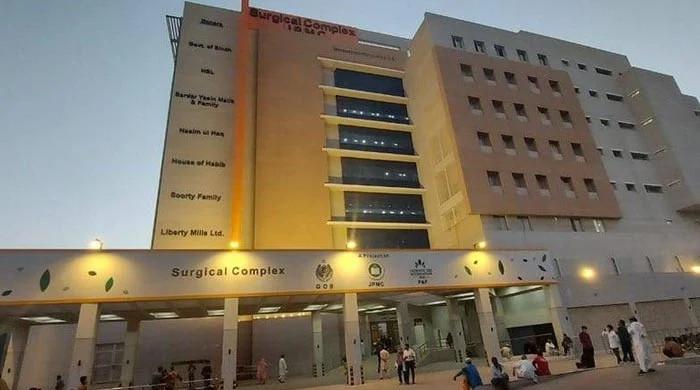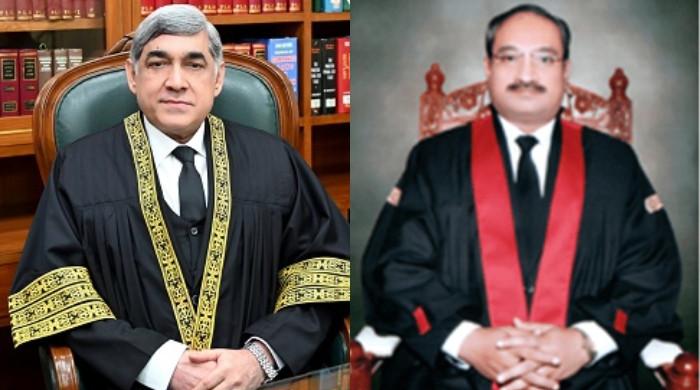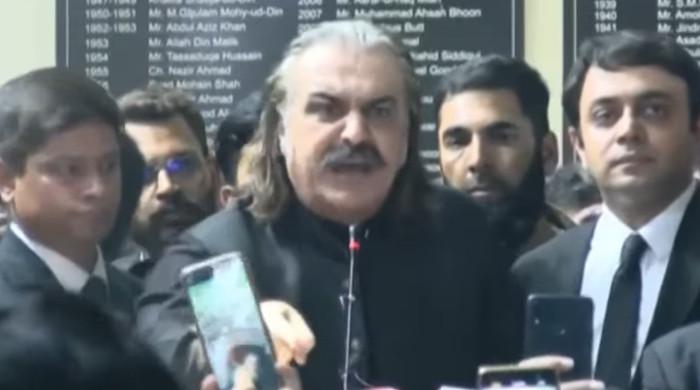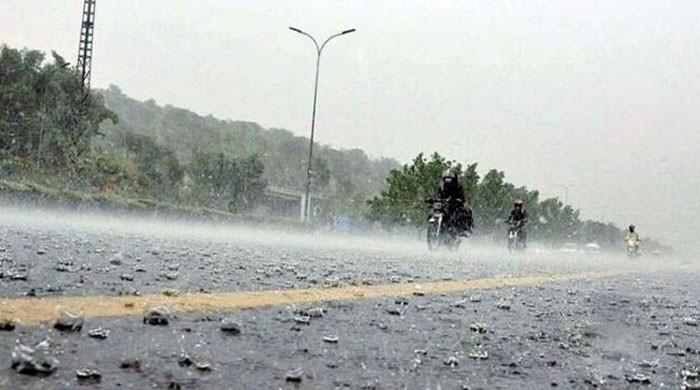Opposition 'fearful of a machine': PM Imran Khan
Premier criticises Opposition for resisting use of EVMs in elections during launch ceremony of Lilla-Jhelum Dual Carriageway
November 16, 2021
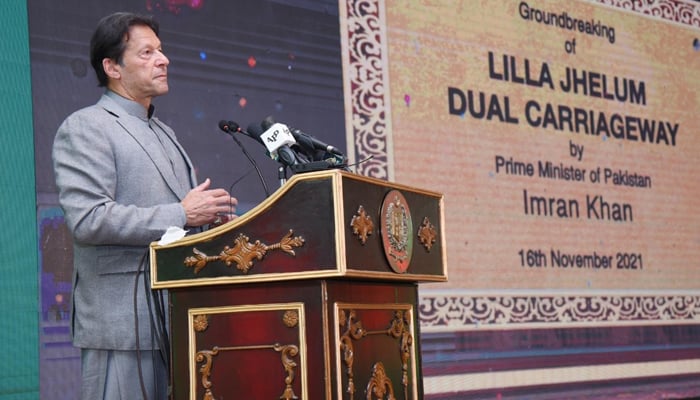
- PM Imran Khan says it surprises him to see Opposition resist use of technology.
- Speaks of Pakistan's growing food and water needs.
- Compares cost for roads built in PML-N vs PTI era, saying more and cheaper roads built in last 3.5 years.
Prime Minister Imran Khan on Tuesday said he finds it surprising the Opposition is fearful of a machine, referring to the electronic voting machine the government aims to introduce prior to the next general elections so voting can take place "transparently".
His remarks came during the launch ceremony of the Lilla-Jhelum Dual Carriageway, which was inaugurated with the touch of a button on a large display screen by the premier.
"I was reflecting on the fact that we used technology and inaugurated this project with the touch of a hand, and that technology has come so far.
"I am surprised to see the Opposition [resist technology], insisting that voting take place traditionally," the prime minister said.
He said "the whole world" now uses technology for voting so it can be a "better, more transparent exercise".
"I am surprised the Opposition have a problem with it; they are afraid of a machine or I don't know of what," PM Imran Khan said.
The premier said that in today's era, when information is simply a click away, a government's performance is plain for all to see.
"People can find out very easily who did what, what conditions prevailed when the government came into power," he said, adding that everyone can now see on their smartphones how Pakistan was deep into the country's "biggest deficit" and how it "paid back the greatest number of loans in the country's history".
PM Imran Khan said the government's aim was to first stabilise the country and then bring about long-term development.
"Countries advance when they think of future generations while planning," he said.
"They don't think of the upcoming elections. They think of our youth, which form 60% of our population, and what is to be done for them," he added.
Citing China's example, the prime minister said that the country's secret to its success is that its leadership thought far ahead. "First they thought of how to bring their people out of poverty and then they ascertained which projects will take China forward."
He said a country will "never progress" if leaders think they should spend money on a "metro bus project right before elections so I can win".
"I am proud our government thought of future generations rather than the next elections," he said.
'Pakistan needs water'
PM Imran Khan said when one thinks of the future, one thinks of Pakistan's water needs.
"The way our population is growing, we have land, but are about to face water shortages," the prime minister said.
He also noted that the country's food requirements have ballooned with the spurt in population growth. "When Pakistan first came into being, this part, which was West Pakistan then, had a total population less than 40 million and now it stands at 220 million."
"So we need to grow crops for a burgeoning population. We have land for this, but we don't have enough water," the prime minister said.
He said that "for the first time in 50 years, three big dams are being constructed". "And InshaAllah in the next 10 years, 10 dams will be made," he added.
'First govt to plant 2.5 billion trees'
The premier recalled how when his government in Khyber Pakhtunkhwa first began planting trees in 2013, they were "made fun of".
He regretted how past governments did not realise that entire forests were razed and how tree cover sorely needed to be replenished for Pakistan to arrest an imminent climate change crisis.
The prime minister recalled how he had spent his childhood in several such forests which the British had left behind but were wiped out, and how he drank "sweet water from a tap" in those days, whilst growing up in Lahore.
"No one thought of the effects tree-cutting over the last 30 years would have [on the climate]. Look at what state the city has been left in," he said.
"Pollution has sky-rocketed. No one thought of planting trees. This is the first government to have planted 2.5 billion trees and InshaAllah, our target is 10 billion trees."
PM Imran Khan said every government in the past tooted its own horn, taking credit for initiatives taken. "But in this government's case, the UK prime minister cited Pakistan's excellent measures against climate change at the United Nations General Assembly," he said.
Recognition by Economist, World Bank amid 'biggest crisis in 100 years'
The prime minister went on to term coronavirus as the "biggest crisis in the world in 100 years".
He said the Economist, which is recognised worldwide for its accurate analysis of countries, judged Pakistan to be "no 1" when it comes to handling the crisis — "saving the people, not letting the hospitals be overwhelmed, as well as keeping the economy afloat".
"So this was not us saying it."
PM Imran Khan further said that the World Bank had assessed that in Pakistan, poverty has declined in the PTI era. "This is not us saying it," he repeated.
The premier said that "yes, it's a difficult time", but urged the people to have "complete trust that the government which has kept you safe from coronavirus, the tough decisions it has made in tough times, and the way we made a body like the NCOC [...] we say with a lot of pride that we are the country that better handled the worst crisis seen in a 100 years [than most others]".
He promised that this "flood of inflation" will be dealt with, terming it an "external influence".
PM Imran Khan said oil prices have "doubled in the past three months", explaining that it has led to a direct rise in import and freight costs by as much as "six times".
"This will last only till the winter," he claimed, also hinting at "another big package" for the relief of the common man, to be unveiled "soon".
Lilla-Jhelum area 'beautiful' with 'ancient archeological sites'
The prime minister said the Lilla-Jhelum pathway "is a very beautiful area", fit for tourism, not only because of its beauty but because of ancient archeological sites.
He said he happened upon an old city, which he was told dated back more than 2,000 years, while once hunting in the vicinity.
The premier added that the entire Salt Range has an abundance of such sites.
PML-N vs PTI
The prime minister also listed down figures comparing development works done in the PML-N era and in the present PTI era.
He said in the PML-N tenure, 645km of roads were laid, whereas in the last three years, 1,750km long roads were constructed.
PM Imran Khan also listed tenders worth 2,317km in PML-N's five-year tenure, while in the last three-and-a-half years, tenders worth 3,238km were finalised.
He also counted a 33.37% difference in the costs of developing double roads between 2013 and 2021, saying development works in the PTI era are "cheaper".
Speaking of four-lane roads, he said they were being constructed at a 53% cheaper cost now, "due to e-tendering which ensures no cheating takes place".
Similarly, motorway tracks are being developed at a 19.6% reduced cost.
"If we made roads at their rates, we would have had to spend Rs1,000 billion in excess," the premier said, adding that one can imagine the transformation that can be brought about with that kind of money.
"And this is why we have been able to make more roads, because they have been made cheaper," he said.
"So in whose pockets did all this money go?" the prime minister inquired, saying that he is only speaking of roads and will not even get into other projects, such as those of the power sector.
He said past rulers "who are living in London have been unable to answer for any of their wealth because it was stolen from here".




